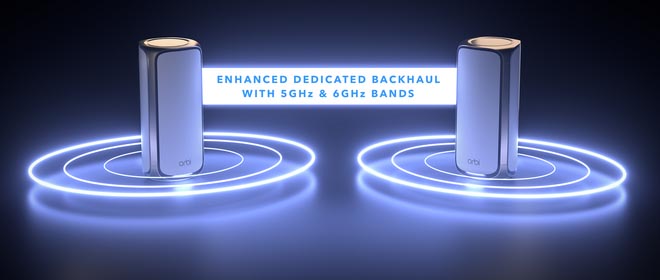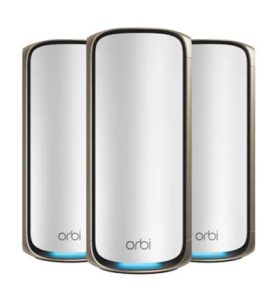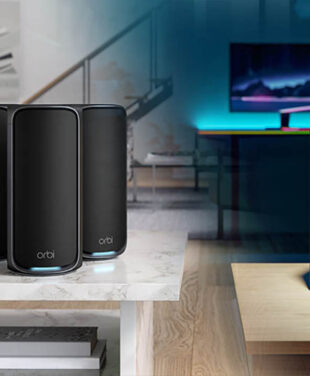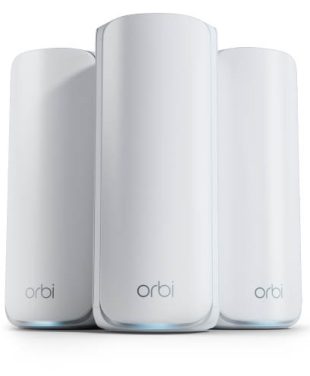You might think of traditional WiFi extender is a little like using an extension cord. It can usually get you power where you need it but maybe not a great permanent solution. Now, what if you find yourself needing multiple extension cords: sure, it might get your devices connected in a pinch, but it doesn’t necessarily create a stable or streamlined setup. Wireless whole-home Mesh WiFi systems have changed the game entirely. By offering a more integrated and efficient approach, Mesh WiFi elevates the potential of extended coverage to a new level of performance and reliability—without the tangle of multiple extenders.
The Challenges of Using Multiple WiFi Extenders
WiFi extenders, also called WiFi repeaters or WiFi boosters, rebroadcast the WiFi signal, giving you additional internet coverage for one or two more rooms. A WiFi extender can be the right choice to improve wireless signal strength and eliminate dead zones in smaller homes.
Understanding WiFi Extender Benefits and Limitations
WiFi range extenders are small, ornate, and unobtrusive on a shelf or table. The range extender can relay a strong signal for WiFi-enabled devices when placed at the appropriate distance from your main router access point. A second extender can also be connected for additional WiFi coverage.
WiFi range extenders are useful but have limited capability. The WiFi signal speeds can slow markedly for device connections further away from your router. You may also need a separate Service Set Identifier (SSID) sign-in, meaning your extender network won’t automatically connect with your router or devices. A range extender won’t give you whole-home WiFi coverage if your home has thick walls or multiple floors.
Are Multiple WiFi Extenders Worth It?
Using multiple WiFi extenders can get complicated and confusing. There will potentially be issues with signal overlap and interference, and problems maintaining consistent speeds across different areas of the home. The first extender and second extender signals may also overlap, causing wireless network interference. Connecting wirelessly one extender to another usually reduces standard and optimal performance.
The two WiFi extenders may not broadcast the same SSID as the main router. Although speed is important in a WiFi extender, range is the focus. The extender cannot give you speed faster than that of your modem, router, or internet service provider.
TIP: Can I daisy chain wifi extenders?
Yes, in some cases you can daisy chain WiFi extenders. You’ll want to be sure to connect the second extender to the first one in the opposite direction as your WiFi router. Your performance will likely see big bottlenecks than with a single extender. Learn about the superior alternative –
Daisy Chain for Orbi Mesh systems.
Why Mesh WiFi is a Superior Option for Your Home
The uptake of home WiFi mesh systems is dramatic, and now WiFi 7 is here for more future-focused networking opportunities. WiFi mesh is the secret behind advanced smart home networks with up to 200 devices seamlessly connected. An upgrade to Orbi WiFi 7 mesh from a dual-band WiFi 6 standalone router makes life easier. Comparing WiFi extenders vs Mesh is a no-contest. NETGEAR Orbi WiFi 7 new router systems are designed to keep pace with the wireless technologies of today and tomorrow.

How Mesh WiFi Works
Unlike a traditional standalone router, Mesh WiFi uses a combination of the router and satellites (nodes) to relay the wireless signal. Multiple mesh router satellites can be positioned around your home to provide a strong and reliable WiFi signal from the front door to the backyard. WiFi 7 mesh can deliver multi-gigabit speeds for 4K/8K streaming, multi-player gaming, conferencing, remote work, virtual reality programs, and more.
With WiFi mesh systems you only need one network name, and there is no noticeable loss of signal strength as you move about your home. Your WiFi devices automatically connect to the satellite with the strongest signal. WiFi mesh is considered the superior option and can blanket your home with blazing-fast and reliable WiFi.
Choosing the Right Orbi Mesh WiFi System
Many people consider Orbi Mesh Systems the best WiFi systems available. NETGEAR leads the way, with WiFi 7 routers and mesh systems that offer faster speeds, lower latency, more bandwidth, and multiple Ethernet ports for the guaranteed fastest available internet speeds from your internet provider.
Orbi 970 Series Mesh System
 Orbi 970 Quad-Band WiFi 7 Mesh is a quantum leap for home WiFi networks. Orbi 970 whole-home WiFi mesh systems include the main router and multiple Orbi 970 WiFi 7 satellites that seamlessly communicate with each other. Orbi 970 quad-band mesh is best for large homes with challenging layouts.
Orbi 970 Quad-Band WiFi 7 Mesh is a quantum leap for home WiFi networks. Orbi 970 whole-home WiFi mesh systems include the main router and multiple Orbi 970 WiFi 7 satellites that seamlessly communicate with each other. Orbi 970 quad-band mesh is best for large homes with challenging layouts.
Orbi 970 Whole-Home Mesh Systems come with NETGEAR Armor WPA3 encrypted security with VPN plus Strict Parental Controls.
Orbi 770 Series
Orbi 770 Tri-Band WiFi 7 Mesh retains all the WiFi 7 capabilities at an affordable price. A 770 WiFi mesh smart home network can include laptops, smartphones, smart TVs, security systems, baby monitors, and more. Orbi 770 is ideal for medium-sized homes, offering balanced performance and value.
Setting Up Your Mesh WiFi System
The NETGEAR range of WiFi mesh systems and routers is second to none. There are loads of mesh WiFi benefits for better home coverage. Options include top-line Orbi 973 systems to budget-friendly Orbi 770 systems. NETGEAR makes it easy to select the best mesh WiFi router for you. The first step in setting up a whole-home WiFi mesh system is assessing the size and layout of your home.
Follow these steps to set up Orbi in minutes
1. Choose the right mesh network for your needs.
2. Find the best router and satellite locations in your home.
3. Plug in your Orbi router and download the Orbi App.
4. Name and connect your Orbi router.
5. Plug in and name your WiFi satellite access points.
6. Finalize your setup and connect seamlessly with your home network, guest network, and smart home IoT network.
Ready to Make the Leap to Mesh Wifi?
FAQs
Can I use multiple WiFi extenders with one router?
You can, but it won’t necessarily create a better internet connection. Extenders can be connected to a router wirelessly or via ethernet cables and Ethernet ports.
What’s the difference between Mesh WiFi and WiFi extenders?
WiFi extenders are independent devices for rebroadcasting the router signal. Mesh WiFi is a fully integrated system that delivers powerful WiFi to every corner of your property for up to 200 connected devices.
Will a Mesh system improve my WiFi in a house with thick walls?
Mesh systems are perfect WiFi for homes with thick walls. The WiFi signal is handed from satellite to satellite in positions unimpeded by walls and other solid objects for the best WiFi coverage possible.
How do I know if I need a WiFi extender or a Mesh system?
WiFi extenders have limited functionality. The need for speed and bandwidth has increased dramatically. NETGEAR Orbi WiFi 7 mesh systems are ahead of the technology curve for future-proofed networking.
Which Orbi Mesh WiFi system is best for large homes?
NETGEAR Orbi 973 WiFi 7 Mesh is a superior whole-home system that can cover up to 10,000 sq. ft. with blazing-fast internet speeds of up to 27Gbps.






